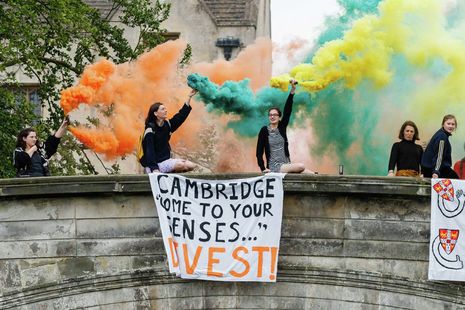Fossil fuel companies don’t use Cambridge to greenwash, says pro-vice-chancellor
Pro-vice-chancellor Neely has been criticised for saying he does not see ‘explicit evidence’ that fossil fuel companies use Cambridge to launder their reputations

A Cambridge pro-vice-chancellor faced student criticism after saying in an open meeting that he doesn’t see “explicit evidence” that fossil fuel firms use the University to greenwash.
Andy Neely, the outgoing PVC for Enterprise and Business Relations, made the statement in last week’s Climate and Sustainability open meeting (15/02).
The open meeting was marketed as an opportunity for students to engage with university officials about “Cambridge’s commitment to tackling the climate crisis – in particular, how it can contribute meaningfully to a net zero world,” according to the University’s Instagram page.
Multiple pro-vice-chancellors spoke at the meeting, which was moderated by Fergus Kirman, undergraduate SU president.
The speakers iterated the important role students have played in driving change in the University’s climate policy. However, they also highlighted the fact that the University itself should have a formal policy in place and not rely on student activism.
A key issue raised by students was the issue of greenwashing linked to fossil fuel funding.
One student stated: “Our concern is, as Mr Topping pointed out in his report, that taking funding from fossil fuels companies endangers the integrity of our research while greenwashing the fossil fuels industry’s reputation.”
“It is further unclear why the University threatens moving banks when it is itself working with companies expanding their fossil fuel production. How are these concerns being addressed?” they added.
Professor Neely answered: “This is why the Committee on Benefactions and External and Legal Affairs (CBELA) is so important. CBELA measures how significant the project is compared to the reputational cost it has on the University and on the fossil fuel company.”
He also remarked: “BP and Shell are the two big companies in the fossil fuel sector that the University has worked with for a long time. Both those organisations have global brands that are as strong as Cambridge University’s global brand.”
“I don’t see evidence of either BP or Shell, when they fund a new PhD student or a project at Cambridge, going: ‘Look we want to make a big noise about how we’re funding this research’.”
“In the conversations we tend to have with them, they are interested in the science, they are interested in the research, and they are interested in pushing knowledge forward. Both of these organisations know that they have no future as businesses if they don’t make the energy transition themselves,” he added.
“I don’t see explicit evidence that within the very large fossil fuel firms that they are tempted to greenwash. If people do have evidence please do send it to me because I will happily raise it with them,” he said.
Students were quick to claim that BP and Shell still participate in greenwashing.
One attendee replied: “Until not long ago, BP provided free lab coats to all Natural Science Part IA students studying chemistry. The whole cohort emblazoned with BP marketing propaganda - madness.”
Another commented: “There is significant evidence that energy research funded by fossil fuel companies has a strong bias towards ‘solutions’ that are amenable to fossil fuel companies.”
Last month, academics proposed a moratorium to ban all new funded partnerships between the University and fossil fuel companies, which is currently being considered by University Council.
Other issues discussed at the meeting included the potential impact of the moratorium on student research, while other students criticised the “delay” in Cambridge’s climate policy.
Responding to this, prof Neely said: “We recognise that it must seem frustrating and slow, but there is a lot of work going on.”
When contacted for comment, professor Neely reiterated: “I have not seen evidence to suggest that the energy companies which Cambridge University works with, use that relationship as an attempt to greenwash their reputations”.
A university spokesperson told Varsity: “The University of Cambridge is in the process of reviewing its relationships with energy firms. In 2020 and 2021 it created a set of criteria for energy companies, which include a RED AMBER GREEN (RAG) scale that is applied to energy firms to determine their alignment with the University’s climate change guidelines.”
“Since the introduction of these guidelines, the University has only accepted funding from energy companies where it was sure that the resulting collaboration would help the industry and UK and global society move to renewable or decarbonised energy,” they said.
 News / Judge Business School advisor resigns over Epstein and Andrew links18 February 2026
News / Judge Business School advisor resigns over Epstein and Andrew links18 February 2026 News / Hundreds of Cambridge academics demand vote on fate of vet course20 February 2026
News / Hundreds of Cambridge academics demand vote on fate of vet course20 February 2026 News / Petition demands University reverse decision on vegan menu20 February 2026
News / Petition demands University reverse decision on vegan menu20 February 2026 News / CUCA members attend Reform rally in London20 February 2026
News / CUCA members attend Reform rally in London20 February 2026 News / Caius students fail to pass Pride flag proposal20 February 2026
News / Caius students fail to pass Pride flag proposal20 February 2026










